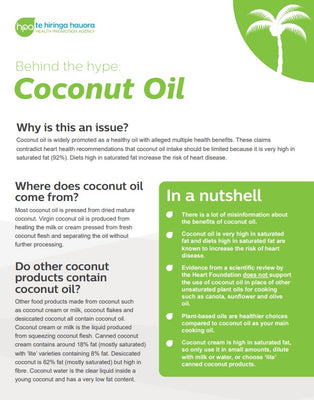Behind the hype: Coconut oil - NPA115

The two-page Behind the Hype information sheets contain evidence-based advice to help you provide clear consistent information to consumers. There is a lot of misinformation about coconut oil. This information sheet will help you answer the tough questions about coconut oil and explain why plant-based oils are a healthier cooking oil choice.
The full resource:
Behind the hype: Coconut oil
In a nutshell
- There is a lot of misinformation about the benefits of coconut oil.
- Coconut oil is very high in saturated fat and diets high in saturated fat are known to increase the risk of heart disease.
- Evidence from a scientific review by the Heart Foundation does not support the use of coconut oil in place of other unsaturated plant oils for cooking such as canola, sunflower and olive oil.
- Plant-based oils are healthier choices compared to coconut oil as your main cooking oil.
- Coconut cream is high in saturated fat, so only use it in small amounts, dilute with milk or water, or choose 'lite' canned coconut products.
Why is this an issue?
Coconut oil is widely promoted as a healthy oil with alleged multiple health benefits. These claims contradict heart health recommendations that coconut oil intake should be limited because it is very high in saturated fat (92%). Diets high in saturated fat increase the risk of heart disease.
Where does coconut oil come from?
Most coconut oil is pressed from dried mature coconut. Virgin coconut oil is produced from heating the milk or cream pressed from fresh coconut flesh and separating the oil without further processing.
Do other coconut products contain coconut oil?
Other food products made from coconut such as coconut cream or milk, coconut flakes and desiccated coconut all contain coconut oil. Coconut cream or milk is the liquid produced from squeezing coconut flesh. Canned coconut cream contains around 18% fat (mostly saturated) with ‘lite’ varieties containing 8% fat. Desiccated coconut is 62% fat (mostly saturated) but high in fibre. Coconut water is the clear liquid inside a young coconut and has a very low fat content.
Should we change to coconut oil?
A recent scientific review by the Heart Foundation does not support the use of coconut oil in place of other plant oils that are lower in saturated fat. The review found that the health benefits of coconut oil claimed in marketing are not supported by sound scientific evidence. Much of the evidence used by product marketers is either from animal studies or from research on medium chain triglycerides. As coconut oil has a different chemical composition to medium chain triglycerides, this research is not applicable.
The review also found that there is limited evidence about the effects of coconut oil on the risk of heart disease. While coconut oil did not raise blood cholesterol levels as much as butter, it raised blood cholesterol more than unsaturated plant oils.
What about evidence from traditional Pacific diets?
Low levels of heart disease in traditional Pacific communities are often used as proof of the benefits of coconut oil. However, coconut oil was not widely consumed as part of a traditional diet in Pacific countries. It was more commonly used on the skin and hair rather than as a food. Coconut was eaten as coconut flesh and coconut milk or cream in
meals together with seafood, vegetables and fruit. This eating pattern was also combined with an active lifestyle.
Which oil to use?
Choose oils with more unsaturated fat (polyunsaturated and monounsaturated) and less saturated fat. Look for oils with more blue and green, and less red shading.

References
Is Butter Good For You? | Nutrition Facts - Heart Foundation
Concise Tables - New Zealand Food Composition Database
Is coconut good for you? - Heart Foundation
This resource is for digital download only.